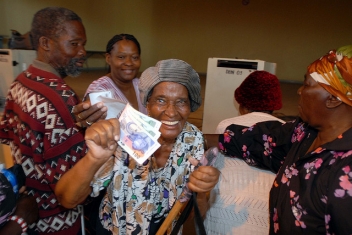 At next month’s G20 meeting in Cannes, world leaders will have no choice but to address European economic woes. However, I fear that after the welcome inclusion of development on the summit’s agenda, they are at risk of not delivering for the millions living in extreme poverty around the world.
At next month’s G20 meeting in Cannes, world leaders will have no choice but to address European economic woes. However, I fear that after the welcome inclusion of development on the summit’s agenda, they are at risk of not delivering for the millions living in extreme poverty around the world.
This is not a question of engaging in a binary, prioritisation debate of the West’s economic concerns, or the crippling daily poverty around the developing world. The G20 must be the time to look for solutions that can help us all as one global economy.
Next month’s talks will be against a backdrop of an increasingly fragmented and ageing world where social protection, including social pensions for all, has leapt forward as the quiet revolution making a difference across the developing world.
Social reform in the developing world
Today’s report by the ILO and Michelle Bachelet should be celebrated for providing progressive recommendations ahead of the G20, which could help extend the future of simple and cost effective social reform in the developing world, aiding a sustainable solution to the world economic crisis.
As the report demonstrates, social protection is the best way of achieving a secure income for all and access to basic social services. HelpAge International has been working with national governments to put in place universal, non-contributory social pensions.
Currently, 80% of the world’s population is not sufficiently protected in old age against health, disability, income risks and poverty. And family support for older people is weakening under the pressures of population ageing, higher poverty, migration and rising food prices.
Social pensions are an investment in families and communities
Universal social pensions are practical, affordable and an investment in families and communities. They can help to break the cycle of poverty between generations that traps millions, tackling increasing economic and social inequality.
Practically, they are an effective way to reach the poorest men and women, easy to administer and have low administrative costs compared with means-tested schemes. Widely adopted by national governments, they are politically popular, empowering governments’ control of their own fiscal planning, and can be at the forefront of innovative technological solutions to poverty.
Many presume that if a country has a low GDP and vulnerable, how will it afford pension and welfare schemes for all? Our experience has shown that providing a pension to all those over 60 would cost between just 1 to 2.5% of GDP in most countries.
The Bachelet report indicates that the gradual implementation of a basic “floor” of social protection for vulnerable groups is achievable from as little as 0.5%; as demonstrated by The Bolsa Familia cash transfer programme in Brazil which covers 26% of the population at this rate.
It is not financial constraint, but political impetus, which will help local economies to grow and in turn boost economic growth around the world.
A revolution in aid delivery
Critically, for our unsettled world, social pensions are an investment in the heart of communities. They are a revolution in aid delivery which puts cash directly into the hands of poor people and will help poorer countries take autonomous responsibility for fighting poverty.
Social protection can be lauded as one of the reasons why, barring an initial dip at the start of the recession, governments in many emerging and low-income countries have been able to keep growth on track and protect their people against food price hikes.
With just a simple cash transfer, the ripple effect is life changing; building an increase in status, dignity and respect of older people in families and communities. They become able to contribute to the wellbeing of the household, help send children to school and buy food, all the time investing in their family and helping to younger generations out of poverty.
This is a new world; even the poorest countries must assert themselves, stimulating and inspiring policies, like this vision for social protection. That is the task ahead at the G20.
The West must not just seek what is just best for them, but what is best for all. Progressive policies must not be seen as apart from economic growth, but rather a long term solution for a global community where rich and poor countries are equal partners.
Read the full ILO report “Social Protection Floor for a Fair and Inclusive Globalization”
Read more about our work on social protection and older people
Go to our Pension Watch, our comprehensive microsite on non-contributory (social) pensions
